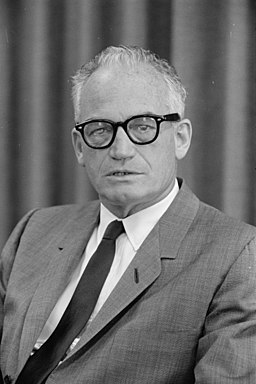Dr. Cleveland Evans writes about names for the Omaha World-Herald. In his April 24th column, he looks at the history of the name Barry.
As a surname Barry has several origins, including Scottish place-names meaning “grassy hill,” Welsh “son of Harry,” and Norman French “rampart.” Since surnames began becoming given names in the 17th century, some boys have been named Barry because of connections with Barry families. In Ireland, though, given name Barry is an Anglicized spelling of Bairre, a medieval pet form of Barrfind and Finnbarr, Gaelic names combining “barr” (top, head) with “finn” (fair).
In the 1850 United States census 30% of the 318 men with first name Barry were Irish-born. Many others had Irish ancestry. Like other immigrant names, Barry lost favor after 1900. It wasn’t even among the top thousand names between 1915 and 1922.
Barry peaked at 68th in 1946, and then plateaued at about 70th until 1961. After Arizona’s Senator Barry Goldwater (1909-1998) was on the cover of “Time” in 1961, Barry had its best baby name rank at 61st in 1962. Goldwater’s devastating loss to Lyndon Johnson in 1964’s Presidential election started Barry on its downslope. It left the top thousand in 2005.
Want to learn more? Read on to find out more the history of the name Barry!





 The Department of Kazakh Language and Turkic studies of Nazarbayev University (Republic of Kazakhstan) together with the Institute of Turkic World Studies of Ege University (Republic of Turkey) will host the II International Symposium of Onomastics May 20-22, 2022 with the support of International Turkic Academy.
The Department of Kazakh Language and Turkic studies of Nazarbayev University (Republic of Kazakhstan) together with the Institute of Turkic World Studies of Ege University (Republic of Turkey) will host the II International Symposium of Onomastics May 20-22, 2022 with the support of International Turkic Academy.



